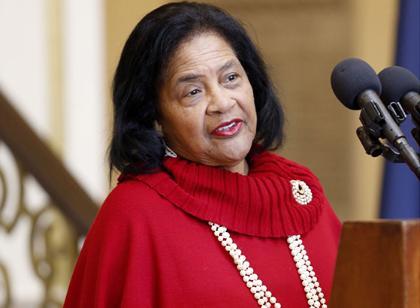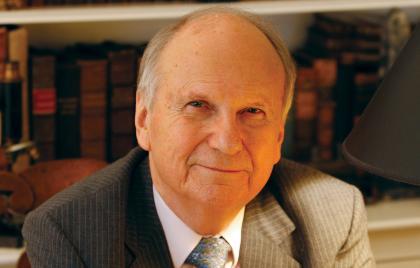
In a year of monumental legal milestones in national civil rights history, Longwood’s 2024 graduates will hear from two participants in court cases centered in Farmville that changed the trajectory of the country.

Joan Johns Cobbs walked out of R.R. Moton High School in 1951 as part of a historic strike led by her sister, Barbara Johns. Cobbs was a plaintiff in the ensuing court case, Davis v. County School Board of Prince Edward County, which was combined with Brown v. Board of Education and decided by the Supreme Court on May 17, 1954. Seventy years later nearly to the day, Cobbs will be the university’s honorary degree recipient at its Undergraduate Commencement on Saturday, May 18, 2024.
Ten years later, in 1964, the Supreme Court ruled in another local case: Griffin v. School Board of Prince Edward County. That ruling ordered that public schools be re-opened and funded, ending Massive Resistance. Justice Hugo Black wrote that opinion with his law clerk A.E. Dick Howard at his elbow. Sixty years later, Howard will be the university’s honorary degree recipient at its Graduate Commencement on Friday, May 17, 2024.
Joan Johns Cobbs was 12 years old when her sister, Barbara Johns, stood on stage at Moton High School in 1951 and led a student walkout of the school. She joined the march out of the crowded auditorium and later the legal effort to end school segregation—her name, like nearly 200 other Prince Edward County residents, is permanently enshrined as part of Brown v. Board of Education.
Cobbs, like her sister, moved from Farmville when public schools were shut down, but maintained a deep connection to her hometown, supporting efforts that in recent decades have transformed the site of the walkout to an acclaimed landmark museum, recognized on the National Register of Historic Places. She has been a vocal proponent of inclusion of the Moton story in Virginia’s Standards of Learning curriculum.
Cobbs will join graduates at Undergraduate Commencement on Saturday, May 18, at 9:30 a.m. on Wheeler Mall.

After finishing his service as Justice Black’s Supreme Court clerk, Dick Howard joined the law faculty at the University of Virginia, where he has taught for more than half a century. He is a graduate of the University of Richmond and of the University of Virginia School of Law, and was a Rhodes Scholar at Oxford University.
When Virginia Gov. Mills Godwin appointed a commission charged with revising the commonwealth’s constitution, the commissioners chose Howard to be their executive director. Howard worked alongside Oliver Hill (who represented Cobbs and other strikers in the Davis case) and Lewis Powell (who would later succeed Hugo Black on the Supreme Court) to craft the new 1971 Virginia Constitution, including the right of every child to an education.
Howard is the recipient of many accolades, including the first Distinguished Visiting Scholar in Residence at Rhodes House, Oxford; fellow at the Woodrow Wilson International Center for Scholars; U.Va.’s Distinguished Professor Award; and U.Va.’s Thomas Jefferson Award – the highest honor that university confers on a member of the faculty.
Howard will address graduates as the university’s honorary degree recipient at Graduate Commencement on Friday, May 17, at 4 p.m. in the Joan Perry Brock Center.
To further commemorate these anniversaries and the local civil rights heroes and citizens who sacrificed so much in the decades-long march to educational access, a special ceremony in partnership with the Moton Museum will also be held in the afternoon of May 19.
In that ceremony, Longwood President W. Taylor Reveley IV will join distinguished guests to recognize those from the historic community of Farmville and Prince Edward exemplifying civil rights in education: Moton strikers and Davis plaintiffs; those locked out from public schools from 1959-64; and those denied or discouraged from enrolling at Longwood University on the basis of race.
